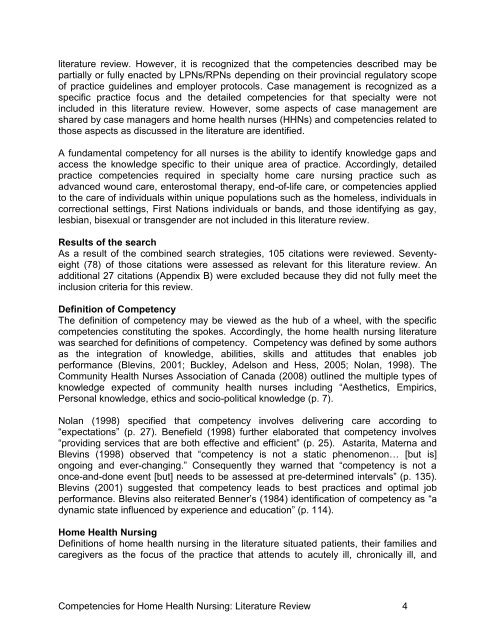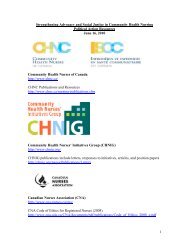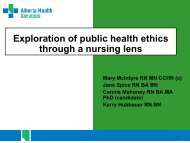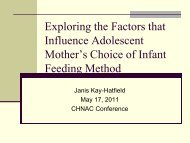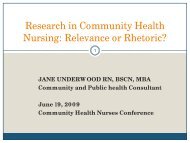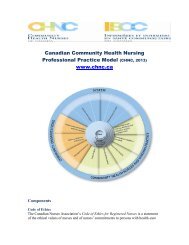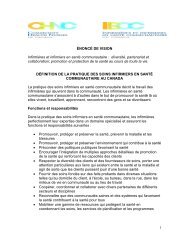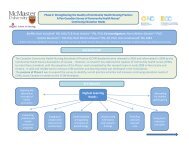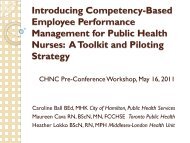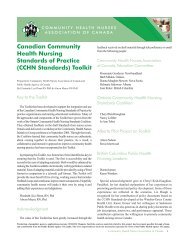Competencies for Home Health Nursing: A Literature Review
Competencies for Home Health Nursing: A Literature Review
Competencies for Home Health Nursing: A Literature Review
You also want an ePaper? Increase the reach of your titles
YUMPU automatically turns print PDFs into web optimized ePapers that Google loves.
literature review. However, it is recognized that the competencies described may bepartially or fully enacted by LPNs/RPNs depending on their provincial regulatory scopeof practice guidelines and employer protocols. Case management is recognized as aspecific practice focus and the detailed competencies <strong>for</strong> that specialty were notincluded in this literature review. However, some aspects of case management areshared by case managers and home health nurses (HHNs) and competencies related tothose aspects as discussed in the literature are identified.A fundamental competency <strong>for</strong> all nurses is the ability to identify knowledge gaps andaccess the knowledge specific to their unique area of practice. Accordingly, detailedpractice competencies required in specialty home care nursing practice such asadvanced wound care, enterostomal therapy, end-of-life care, or competencies appliedto the care of individuals within unique populations such as the homeless, individuals incorrectional settings, First Nations individuals or bands, and those identifying as gay,lesbian, bisexual or transgender are not included in this literature review.Results of the searchAs a result of the combined search strategies, 105 citations were reviewed. Seventyeight(78) of those citations were assessed as relevant <strong>for</strong> this literature review. Anadditional 27 citations (Appendix B) were excluded because they did not fully meet theinclusion criteria <strong>for</strong> this review.Definition of CompetencyThe definition of competency may be viewed as the hub of a wheel, with the specificcompetencies constituting the spokes. Accordingly, the home health nursing literaturewas searched <strong>for</strong> definitions of competency. Competency was defined by some authorsas the integration of knowledge, abilities, skills and attitudes that enables jobper<strong>for</strong>mance (Blevins, 2001; Buckley, Adelson and Hess, 2005; Nolan, 1998). TheCommunity <strong>Health</strong> Nurses Association of Canada (2008) outlined the multiple types ofknowledge expected of community health nurses including “Aesthetics, Empirics,Personal knowledge, ethics and socio-political knowledge (p. 7).Nolan (1998) specified that competency involves delivering care according to“expectations” (p. 27). Benefield (1998) further elaborated that competency involves“providing services that are both effective and efficient” (p. 25). Astarita, Materna andBlevins (1998) observed that “competency is not a static phenomenon… [but is]ongoing and ever-changing.” Consequently they warned that “competency is not aonce-and-done event [but] needs to be assessed at pre-determined intervals” (p. 135).Blevins (2001) suggested that competency leads to best practices and optimal jobper<strong>for</strong>mance. Blevins also reiterated Benner’s (1984) identification of competency as “adynamic state influenced by experience and education” (p. 114).<strong>Home</strong> <strong>Health</strong> <strong>Nursing</strong>Definitions of home health nursing in the literature situated patients, their families andcaregivers as the focus of the practice that attends to acutely ill, chronically ill, and<strong>Competencies</strong> <strong>for</strong> <strong>Home</strong> <strong>Health</strong> <strong>Nursing</strong>: <strong>Literature</strong> <strong>Review</strong> 4


